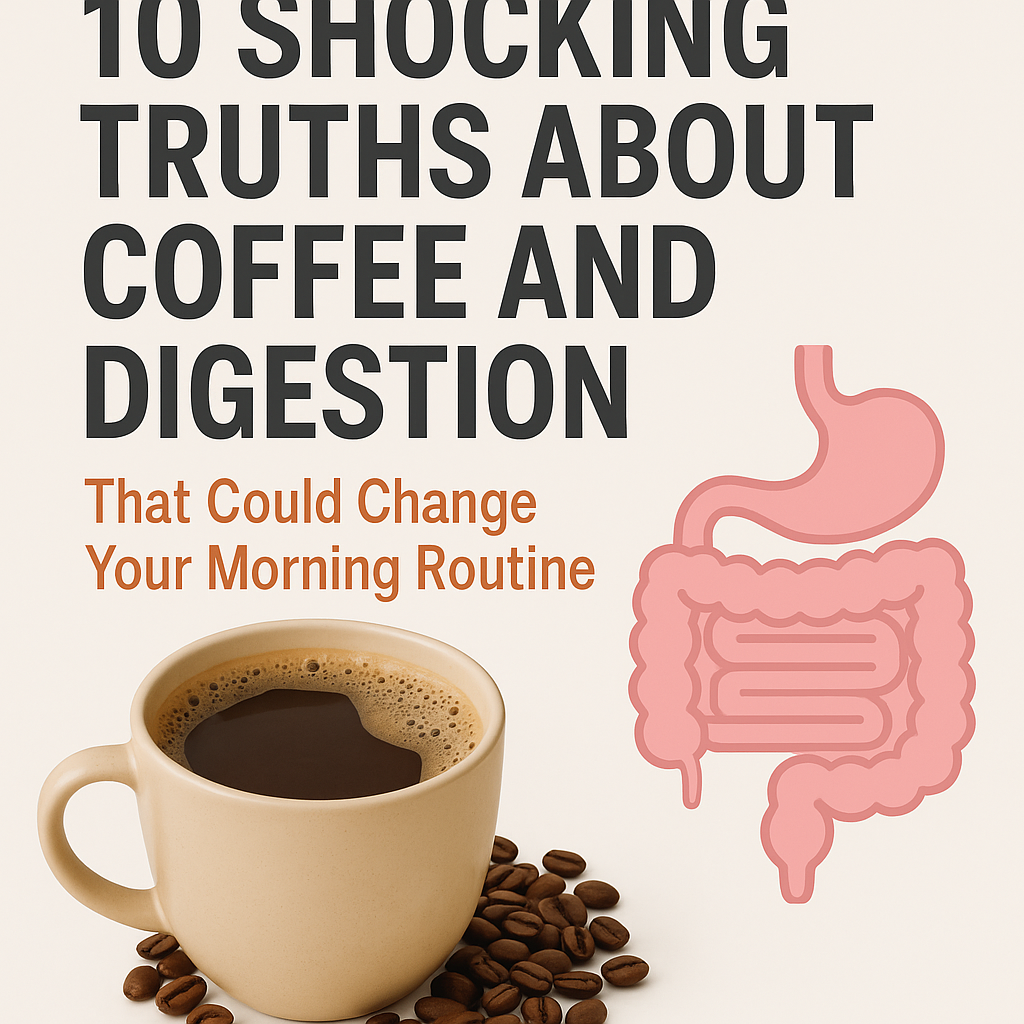
⚠️ Affiliate Disclaimer: This post may contain affiliate links, which means I may earn a small commission — at no extra cost to you — if you make a purchase through one of these links. I only recommend products or services I genuinely trust and believe can provide value. Thank you for supporting My Medical Muse!
10 Shocking Truths About Coffee and Digestion That Could Change Your Morning Routine
Is Coffee Wrecking Your Digestion? Surprising Gut Facts You Need to Know
If you’re someone who starts the day with a hot cup of coffee, you’re not alone. Coffee is the most widely consumed psychoactive beverage in the world, cherished for its energizing effect, rich aroma, and comforting warmth. But while coffee has many benefits, like boosting alertness and even reducing the risk of some diseases, it may not be so kind to your gut.
If you’ve ever felt bloated, experienced acid reflux, had urgent trips to the toilet, or just felt “off” after your daily brew, coffee might be part of the problem. In this deep dive, we’ll explore whether coffee could be secretly sabotaging your digestion and reveal surprising gut facts that most people don’t know.
Coffee and Stomach Acid: A Double-Edged Sword
One of the most immediate effects of coffee is its ability to stimulate stomach acid production, while this is useful for digesting food, excess stomach acid can backfire. Coffee stimulates the hormone gastrin, which tells your stomach to release more hydrochloric acid. This is helpful when you’re eating a meal, but drinking coffee on an empty stomach, especially first thing in the morning can result in too much acid with nothing to digest.
What this means: You may feel a burning sensation (heartburn), your risk for acid reflux and GERD (gastroesophageal reflux disease) may increase.
The acidic environment could damage the stomach lining over time, especially if you have existing issues like gastritis or ulcers. Even decaf coffee has been shown to increase stomach acid, meaning it’s not just the caffeine that’s to blame.
Also Read: Health Benefits of Coffee
Coffee and the Gut-Brain Axis
Your digestive system and your brain are deeply connected through the gut-brain axis, a two-way communication channel involving nerves, hormones, and gut microbes.
How coffee plays into this: Coffee stimulates the central nervous system, increasing alertness, but it also triggers the release of stress hormones like cortisol and adrenaline. These can affect gut motility (how fast things move through the intestines) and can cause symptoms like cramping or diarrhea in sensitive individuals.
Resulting issues:
- IBS (Irritable Bowel Syndrome) symptoms may flare up.
- You might feel anxious or jittery, which feeds into gut distress.
- Loose stools and abdominal cramping may become more common.
Some people refer to coffee as their “natural laxative,” but this effect can actually be a sign of gut irritation, not a benefit.
Coffee and Your Microbiome: Friend or Foe?
Your gut microbiome, a bustling community of trillions of bacteria is essential for digestion, immunity, and overall health. So how does coffee affect it?
Coffee contains polyphenols, plant compounds with antioxidant properties. These may feed beneficial bacteria like Bifidobacteria. However, excessive coffee (especially with added sugar, creamers, or artificial sweeteners) can promote the growth of harmful bacteria or yeast. Coffee can both help and harm your microbiome depending on the amount you drink, what you put in it, your individual gut health.
Some studies show that coffee drinkers may actually have more diverse gut bacteria than non-drinkers but this is only in moderate amounts (1–2 cups/day) and without additives.
Coffee and Gut Motility: Too Much of a Good Thing?
Coffee increases the movement of the digestive tract, a process known as peristalsis. That’s why it’s commonly used to “get things going” in the morning. However, if motility speeds up too much, your body doesn’t have enough time to absorb nutrients from your food, you might end up with looser stools, bloating, or even malnutrition over time.
Sensitive to caffeine? People with IBS, SIBO (Small Intestinal Bacterial Overgrowth), or IBD (Inflammatory Bowel Disease) often have an exaggerated response to caffeine and may find coffee worsens symptoms.
Coffee, Bile, and Fat Digestion
Coffee can stimulate the production of bile, a fluid made by the liver that helps break down fats. In some people, this increase in bile can causes nausea if the stomach is empty, trigger gallbladder contractions that lead to pain or discomfort, cause an urgency to go to the bathroom shortly after drinking coffee.
People without a gallbladder are especially sensitive to this effect, since they no longer have a bile storage system to help regulate release.
Acidity of Coffee and the Gut Lining
Coffee is naturally acidic, with a pH of around 4.85 to 5.10. This can irritate the lining of your digestive tract, particularly if consumed frequently or in large amounts.
Potential consequences:
- Irritation of the esophagus and stomach lining.
- Increased risk of ulcers if you already have Helicobacter pylori bacteria in your gut.
- Sensation of burning or rawness in the throat or upper stomach.
Cold brew coffee is less acidic than hot brewed coffee and may be easier on the stomach.
Coffee Additives That Could Be Wrecking Your Gut.
The problem may not be the coffee itself but what you’re adding to it. Common culprits include:
- Artificial sweeteners: These can disrupt the microbiome and cause gas, bloating, and diarrhea.
- Sugar: Fuels harmful gut bacteria and yeast overgrowth.
- Non-dairy creamers: Often contain hydrogenated oils, thickeners, and emulsifiers that inflame the gut lining.
- Flavored syrups: Loaded with additives and preservatives that can trigger IBS and leaky gut symptoms.
Stick to black coffee, or use gut-friendly additions like oat milk, coconut milk, cinnamon, or pure stevia.
Coffee and Leaky Gut: Is There a Connection?
Leaky gut, or intestinal permeability, occurs when the tight junctions in the intestinal wall become compromised, allowing undigested food particles and toxins to enter the bloodstream.
How coffee might contribute:
Chronic stress on the gut from excess caffeine and acidity.
Inflammation caused by poor-quality coffee or additives.
Disruption of the gut microbiota balance.
Although coffee alone hasn’t been proven to directly cause leaky gut, its combination of irritants, acid, and hormonal stimulation can contribute to gut barrier dysfunction in people who are already vulnerable.
Caffeine Dependence and the Gut:
Daily coffee use can lead to caffeine dependence, which affects more than just your mood or energy levels.
Withdrawal symptoms include:
- Constipation (since motility slows down when you quit).
- Headaches, fatigue, and mood swings.
- Sluggish digestion and bloating as your body adjusts.
What this means for digestion:
If you rely on coffee to “poop,” your gut may become lazy over time and struggle to function properly without stimulation.
When Coffee Is Good for Your Gut
Let’s not throw out the coffee beans just yet. In moderation and in the right form, coffee can be part of a gut-healthy routine.
Potential benefits include:
- Increased antioxidant intake (polyphenols).
- Support for beneficial bacteria (if consumed black or with minimal additives).
- Mild laxative effect for people with slow digestion or constipation.
Choose the right coffee:
- Organic, mold-free, and pesticide-free beans.
- Light to medium roasts (lower acrylamide levels).
- Cold brew or French press to reduce acidity.
Final Thoughts: Should You Ditch Coffee for Gut Health?
The answer depends on your body. you may want to cut back or switch up your coffee habits if:
- You experience bloating, reflux, or loose stools.
- You rely on coffee for bowel movements.
- You have conditions like IBS, SIBO, or acid reflux.
- You’re noticing increased anxiety or jitteriness.
On the flip side, if your digestion is solid, you tolerate coffee well, and you enjoy a cup or two without symptoms, then you’re probably fine.
Tips to protect your gut while still enjoying coffee:
- Avoid drinking it on an empty stomach.
- Switch to cold brew or low-acid varieties.
- Skip sugary syrups and creamers.
- Use gut-friendly additions like collagen, cinnamon, or MCT oil.
- Don’t exceed 2–3 cups per day.
👩⚕️ Need Personalized Health Advice?
Get expert guidance tailored to your unique health concerns through MuseCare Consult. Our licensed doctors are here to help you understand your symptoms, medications, and lab results—confidentially and affordably.
👉 Book a MuseCare Consult Now

